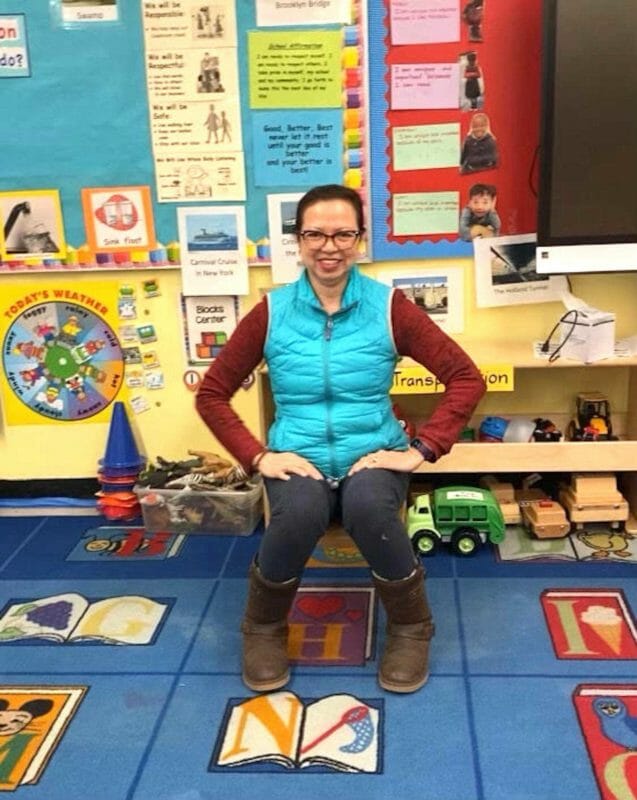Filipina teacher’s heart is full after serving in U.S. school system

Gloria Cheng spent four decades teaching in U.S. private and public schools. CONTRIBUTED
Within the last 34 years since Gloria Cheng, 64, moved to the U.S., the country has grappled with different social issues that are still common themes to this day. Cheng is a testament to how Filipinos can thrive in a country beset by polarizing immigration policies, street crimes, racial justice and equity issues, and now anti-Asian hate crimes.
With the shortage of teachers from pre K-12 still prevalent, Cheng came at a time when hard work and working smart were both rewarded. Like most immigrants, she took on different hats when she was starting out.
“There are many opportunities to better your life in the U.S. if one is willing to work hard. While I was searching for a teaching job, I worked as a part-time nanny, weekend caregiver, waitress, tutor, and I volunteered as an Early Childhood teacher in Chinatown,” she beamed, recalling each experience.
Gloria Cheng moved to the U.S, in 1987 when Ronald Reagan was the President. The country was plagued with drugs and street gangs. “New York was not what I envisioned it to be when I first arrived. Subways were crowded. Streets were dirty. Graffiti and muggings were rampant.” she recalls.
There was a shortage of teachers, and U.S. schools were open to sponsoring teachers from the Philippines. She credits Brother Shield and the Archdiocese of New York with helping her and many other Filipino teachers navigate work visa applications. With an initially small teaching salary, she had to manage the cost of visa processing fees. Cheng had to learn living with roommates who were not family members, as well as stretching and budgeting her means for living expenses.
She had a fair share of racial insults and derogatory remarks directed at her as jokes by friends and strangers. Her application to rent an apartment was rejected because she was not of a certain race. Professionally, as a new teacher in a racially homogenous community, she encountered distrust because she looked different.
Cheng vividly remembers being verbally harassed with racist, stereotypical remarks by a 6th grade student and an adult at work. As a school policy, she followed protocol and reported these incidents to the school administration. “I understood then the complexity of the society I was in. I was in school to educate my students and I made the conscious decision to focus on that goal.” she explains.
In spite of already having a Bachelor of Education degree acquired in the Philippines and teaching experience in Manila, Cheng had to meet state requirements to be fully certified and legally employed as an educator fully recognized by the NY State Department of Education. While working full-time as a classroom teacher, she attended school after work at night and on weekends to earn her master’s degree in Teacher Education from Bank Street College of Education.
With almost four decades as an educator in both private and public schools, Cheng can match the demands of the U.S. education system. Her first 11 years of teaching was in a private school on the Upper East Side in New York. She was an early childhood teacher for upper income families. “The school had a philosophy of learning through play. The class environment was relaxed and allowed creativity to take its course. Learning was organic.” she shared.
The next twenty years until she retired in July 2020 was spent teaching in a public school in Harlem, a neighborhood in upper Manhattan. Students were mostly from low-income working class families and/or families receiving government assistance. Many of her students needed support in their schoolwork. “As a teacher, I had gone out of my way finding creative ways to teach the mandated curriculum by incorporating interesting materials and treats that engaged students’ interest to learn and participate in their classroom work,” she said.
As a teacher of young children, it was her responsibility to accept them for who they were and where they were developmentally. Their socioeconomic background might have had a role in their readiness for school success, but that was never an issue in class. Extra support through individualized and focused instruction were provided to those who needed the assistance.
“I did not experience any challenge from my students as a Filipino teacher. My young students perceived me as their teacher and sometimes as a surrogate mother in school. They were curious about my skin color and my straight dark hair. My race did not get in the way of learning,” she added.
As an Asian teacher, she helped widen the perspectives of teachers, students and parents that she worked with. She was able to share her culture by sharing some famous Filipino and Chinese dishes. Coming from her Chinese Filipino roots, she brought to school the celebration of Chinese New Year and taught her students how to use chopsticks and phrases in Mandarin and Tagalog. She shared folklore and sang songs from the Philippines.
Cheng, happily married for almost 21 years, met her spouse at a social gathering. In an intercultural marriage, she and her spouse both made adjustments in food, how they communicate and manners of dealing with friends and families. She recounts that the first few years of marriage were mostly trial and error. “We made mistakes and had the typical conflicts most couples would experience, but the most important thing has been to communicate our thoughts with respect and understanding,” she explains.
Throughout the government mandated shelter in place and pandemic lockdown, Cheng and her husband grew closer. They took daily walks, rode bikes and hiked together as part of their fitness routine. They have visited families from her husband’s side in Buffalo, New York and carefully taken short vacations in and around New York state. They have also increased the number of houseplants and adopted a fish that they named Prince William.

Gloria Cheng is now happily retired from teaching. CONTRIBUTED
After her retirement, Cheng has been reading more and listening to audiobooks and podcasts. As she misses daily social interactions, she has been attending meetings, webinars, and concerts on Zoom. Her daily pre-retirement and pre-pandemic routine would be waking up at 4 a.m. and parking in front of the school by 6 a.m. until the school building opens at 7 a.m., has been replaced with a self-care regimen of morning stretching and meditation, a YouTube exercise program, and a prayer meeting with her Filipina friends at day’s end.
“I definitely do not miss the early morning routine! What I miss most is the social interactions with the children, parents and co-educators in my class and school,” she quips.
While everyone’s American dream is based on material rewards, Gloria’s version is successfully living her life in a country that she now calls home and being a good, contributing member of society.
“I am in the position where life is comfortable.” When travel restrictions ease, she wants to go to the Philippines, New Zealand and Australia to visit family and friends. “I just want to travel and see the world more,” she concludes.

